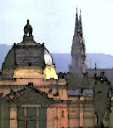Bosnian Croats hold the headlines
The sentencing of Dario Kordić and Mario Čerkez at the Hague war crimes tribunal highlighted the continued difficulties created for the reformist government by nationalists in Bosnia. Kordić was told by the judge at the tribunal that he was as guilty as those who pulled the triggers for the deaths of hundreds of Muslim men, women and children in the Lašva Valley in 1993. He was sentenced to 25 years, Čerkez to 15.
Stirring up the locals
But those sentences fired up separatist sentiment in Hercegovina and their supporters in Croatia. The association for the protection of Homeland War values (HONOS) and the Croatian Pure Party of Rights (HCSP) condemned the judgements, and said they confirmed the Hague tribunal is merely a political institution.
HONOS president Nenad Ivanković said: "The Kordić-Čerkez sentences confirm that the Hague war crimes tribunal is primarily a political court whose main task is to confirm prejudged guilt and not prove the actual guilt." And HONOS bitterly criticised what it called the "disgraceful role President Mesić's false testimony against Gen Blaškić had in that process, when he accused Croatia of being an aggressor in Bosnia-Hercegovina."
Busovačaćs boy
Thousands of Bosnian Croats demonstrated in Kordić's hometown of Busovača, against the convictions. The noisy but peaceful protests were led by the former Croat member of Bosnian's tripartite presidency, Ante Jelavić, who is now leading moves by nationalist parties to create a separatist Croat entity in Bosnia. At the moment, Croats form a federation with Muslims in 51 per cent of Bosnia-Hercegovina, while Serbs control the other 49 per cent known as Republika Srpska.
Friends of Franjo
The previous regime in Zagreb certainly supported the idea of a separate Croat entity. Večernji list reported that the first Croatian Defence Minister General Martin Špegelj had confirmed that top officials of the late administration, including President Franjo Tuđman, Defence Minister Gojko Šušak plus Bosnian Croat Mate Boban did send soldiers to fight secretly in Bosnia-Hercegovina.
Current President Stipe Mesić insisted there was no official decision in accordance to deply the army from Croatia. "There may be testimony by those who say parts of the Croatian Army were sent there—but those who sent them there should be held responsible, not the whole of Croatia," said the President. And he also condemned the separatist moves. "That would lead to the ghettoization of Croatia itself," he said.
You can't stop us
But Ante Jelavić was not to be deterred. He said Croats could no longer take part in the Muslim-Croat federation. A source in the HDZ BiH (Croatian Democratic Union of Bosnia-Hercegovina) told Reuters that Croatian Prime Minister Ivica Račan and the chairman of the HSLS (the Croatian Social Liberal Party), Dražen Budiša, had phoned Mr Jelavić, and warned him not to take any radical steps and to leave room for dialogue.
But on Saturday, Jelavić's HDZ-BiH and other small nationalist parties declared an independent assembly to make "historic decisions" for Croats in Bosnia-Hercegovina.
Tribunal wins a few friends
The Hague tribunal did its best to prove its impartiality by indicting several people for war crimes committed during the 1991 attack by the Yugoslav army on the southern Croatian port city of Dubrovnik.
The names of those indicted were not released. Dubrovnik, one of Europe's most beautiful cities, "the pearl of the Adriatic," was shelled heavily by the Yugoslav army for three months beginning in October 1991 after Croatia broke away from Yugoslavia. The JNA, the Yugoslav Peoples Army, had always claimed that all its actions in Croatia had been aimed at protecting the Serb community living in the breakaway republic. But there were very few Serbs living in Dubrovnik, and none of them had asked to be rescued.
The deal's off
Croatia's new government also demonstrated its faith in the tribunal by calling on Yugoslavia to hand over its former leader Slobodan Milošević to face charges of genocide. Croatia wants Yugoslav President Vojislav Koštunica to extradite his predecessor to a court outside the country. The late President Franjo Tuđman was widely believed to have done a deal with Milošević in 1991 to divide Bosnia at the expense of its Muslims.
In a symbolic break with the past, Croatia's UN envoy Ivan Simonović made a formal application to the UN International Court of Justice, saying "the present government of Yugoslavia continues to violate the genocide convention by not punishing perpetrators of genocide."
What it's all for
Croatia needs to show support for international justice and common standards of human rights as part of its bid for membership of the European Union. Now Greece has said it is willing to act as a supporter during Croatia's accession talks.
"An agreement will soon be signed between the EU and Croatia," Greek Prime Minister Costas Simitis told reporters after a meeting with Swedish Prime Minister Göran Persson and his Croatian counterpart Ivica Račan. Greece had arranged Račan's meeting with the prime minister of Sweden, which holds the EU's rotating presidency.
"We hope by the end of the Swedish presidency we will have signed the Stabilisation and Association Process (SAA). Our target is to join the European Union by 2006," said Croatia's Deputy Foreign Minister Vesna Cvjetković Kurelec.
Dan Damon, 3 March 2001
Moving on:
- Archive of Croatian news reviews
- Browse through the CER eBookstore for electronic books
- Buy English-language books on Croatia through CER
- Return to CER front page
Sources:
Vjesnik
Verčernji list
BBC Radio




